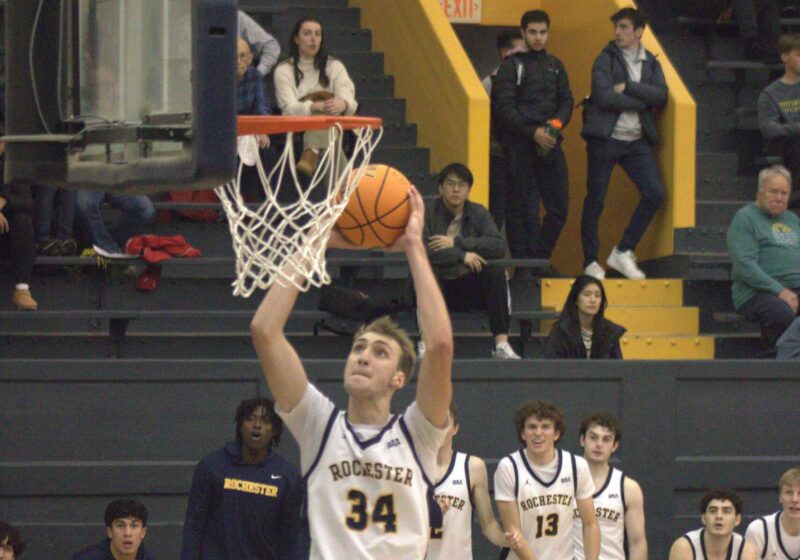
Courtesy of Rare Books and Special Collections, University of Rochester Libraries
In an effort to curb what has escalated in recent years into a day of excessive drinking, this year’s Dandelion Day will be held on Friday, April 27, rather than the Saturday before reading period when it is traditionally held.
The decision — the result of months of ongoing discussion between the administration and various student groups — was publicly announced to the Students’ Association Senate meeting on Monday, Feb. 13.
“It’s a symbolic move,” Dean of Students Matthew Burns said of the decision. “We’re trying to go back to the roots of the day and make it more closely aligned with events from old D-Days.”
Burns hopes to move the celebratory day back to a time when it revolved more around honoring University traditions and having fun, rather than around what many have seen as a destructive focus on alcohol consumption — a focus that has become enmeshed in UR culture particularly in recent years.
Despite the unsafe behavior in years past that caused the administration a “great amount of worry,” canceling the day, which has been a UR tradition since the 1950s, was not how UR wanted to handle the problem, Burns said.
“We wanted to keep it, but make it safer,” he explained.
Associate Dean of Students Anne-Marie Algier agreed with this assessment.
“Everyone wanted to make the day safer,” she said. “Everyone agreed on that.”
The second significant change to this year’s D-Day is that the budget will be nearly triple that of previous years.
“Students can probably expect D-Day to be at least three times as big, if not more,” Burns said.
The increase in spending will boost funding both for the main concert — which Burns said the administration hopes will be a “bigger, better name” — and for an expanded selection of activities, which they hope will help divert some of the focus away from the drinking mentality.
Burns also plans to significantly increase advertising for this year’s event, also in the hope that students will view the day in a more positive light.
“The idea is to make it so fun that you can’t resist going,” he said.
Burns anticipates “some resistance” from students about the change, but said that he hopes the resistance will “make way to excitement” in coming months.
Since 2008 when Campus Activities Board (CAB) decided to stop sponsoring D-Day because it had become too difficult to control and “not worth the investment,” UR has kept both subjective and objective measurements of the drinking culture, Burns said.
In 2008, drinking-related incidents declined, according to Burns, but have been increasing every year since. CAB re-started its participation in the day after its SA fundraising was threatened.
According to Burns, this data has shown that “all hell breaks loose” between the hours of 12 and 4 p.m. and that UR simply cannot afford to have incidents continue to rise as they have in the last three years.
Perhaps no more evidence about the drinking culture is needed than an email sent by a URMC doctor, whose name was not disclosed, to Burns on Monday, April 26, 2010 — the Monday after Saturday’s D-Day.
The email states that from 3 to 11 p.m. on Saturday evening, “it was a pretty embarrassing moment for the River Campus at UR … nine undergraduates all sloppy drunk from Dandelion Day. All at risk for aspirating on their own vomit … Two so agitated and disruptive that they had to be physically and chemically restrained. Four under the legal drinking age of 21.”
The email left off on a somber note: “Just a matter of time before someone dies during these festivities.”
Burns said that, given the ample evidence of escalating problems and the fact that the UR had “almost universal consent” that the day had to become safer to keep it, the decision for some change was necessary.
President of CAB and senior Palida Noor said she initially felt resistance toward the decision, especially given the fact that she is a senior.
“But now I’m more excited to be a part of the change,” she said. “I’m excited to leave [the day] even better than before and hopefully leave it as the largest ever D-Day.”
CAB has not decided on the headlining band for the concert or on specifics of the other
activities, but Burns said that students will “see the pieces as they come together” through the increased advertising.
SA President and senior Bradley Halpern asserted that everyone who participated in discussion about D-Day agreed that changes to make it safer were essential, though opinions on how to do so were wide-ranging.
“Everyone wanted to keep the day rather than lose it,” he added.
Burns could not provide specifics of the increased money or the breakdown between concerts and activities, but hinted at the possibility for rides, which were present in past D-Day celebrations but cannot currently happen because of liability issues.
“Even with the enhanced money, we can’t do everything we want to do,” he said.
Despite what many students have said is the inconvenience of the decision to hold the day on Friday, Burns explained that by starting the day with classes, some of the focus on drinking born by starting the day early on Saturday morning might be diverted.
He also said that activities will be planned to interfere with students’ classes in the least obtrusive way and that Friday made the most sense because the majority of students have fewer classes on that day, many of which occur in the morning anyway.
In addition, D-Day was traditionally held on a weekday in years past and holding the day on Friday will provide access to University resources, faculty and staff — resources that are more difficult to access on a Saturday and that could make the day safer for students, Burns said.
Many students, however, believe that the decision to change the day to Friday will not alleviate any of the drinking problems.
“I don’t think it’s going to help,” senior Brianna Sayers said. “Most people don’t have a lot of classes on Friday so they’re probably just going to skip them to drink.”
A senior Residential Adviser, who asked to remain anonymous because of her position, said that she does think the decision has some potential to reform the drinking culture and that she likes the fact that D-Day is a campus wide celebration during which students come together.
“I think it has the potential,” she said of the decision to change the day. “I can see where they’re coming from.”
Most students were not quite so optimistic. “I think it’s a bad idea,” junior Claire Donohue said. “People are just going to do their own D-Day on Saturday.”
Donohue disagreed with the idea that D-Day has gotten unsafe in recent years, saying that she thinks the day is “pretty regulated.”
“I think it is a poor decision,” junior Bobby Brown said. “Teachers are not going to be happy that people are skipping classes.”
Brown said he agrees that the day has become unruly, but thinks the administration should not act to curb the drinking culture.
“It’s definitely unsafe,” he said. “But I love it.”
Former SA president and senior Scott Strenger believes that UR students should rise to the occasion and take the administration’s decision “like adults.” Strenger initially reacted to the decision by planning a petition, but decided against it.
“A petition complaining about the date change and then asking to be treated like adults is the equivalent of a child holding their breath when their parents tell them they need to go to sleep and then asking why they can’t have a later bedtime,” Strenger said.
“If we want to be taken as adults, we shouldn’t act like children.”
Strenger does believe changing the day to Friday could increase problems if students choose to hold an “unofficial” D-Day on Saturday.
Ultimately, Burns believes that the potential for change is in student hands.
“In the end it’s going to depend on students and whether they heed the call for change,” he said. “If they do, the future of the event will look bright. If not, it’s bleak.”
Students interested in expressing their ideas for D-Day programming are invited to do so at a forum hosted by CAB on Sunday, Feb. 19 at 4:30 p.m. in the Gowen Room. According to Noor, this will not be a place to discuss the administration’s decision, but rather a forum for expressing ideas for the day given the additional funding and the fact that it will be held on Friday.
Buletti is a member of the class of 2013.




